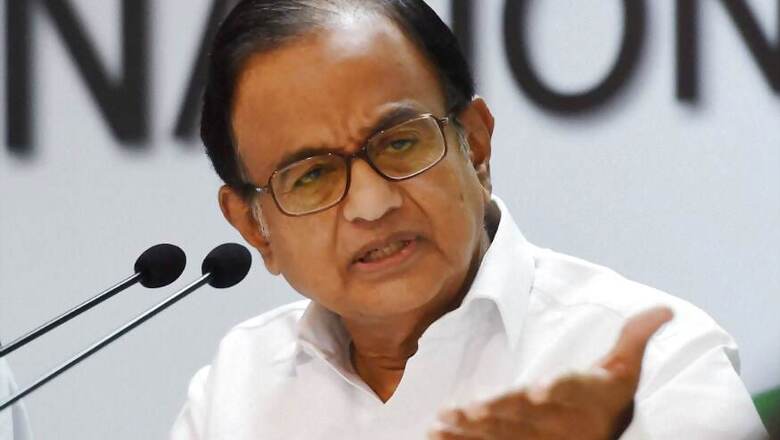
views
Two months after the demonetisation drive began, former Union finance minister P Chidambaram tells News18's Pallavi Ghosh that the government has no business controlling the supply of money. He is "disappointed" that the RBI, under Urjit Patel, "compromised" the independence and autonomy of the institution. Excerpts from an exclusive interview:
The Election Commission has scheduled the Assembly polls for five states to begin on February 4, three days after the Union Budget. Do you think the Centre and the BJP have an unfair advantage here? Do you think the Budget should be postponed till the voting is over?
Going by the 2012 precedent, which was done at the insistence of the BJP, it is only fair that the budget is presented after the polling dates.
Should the government and RBI make a conscious decision to reduce the currency notes in circulation to promote digital transactions? What is the purpose of demonetisation and then remonetising the whole amount?
The government has no role in deciding the quantum of notes that should be issued for circulation. The sole authority in the matter of issue of notes is the RBI. How much money will be required to keep pace with the needs of the economy and for economic growth — called money supply — is an aspect of monetary policy and the RBI has total autonomy in determining the monetary policy. Government cannot claim to make a ‘conscious’ decision on reducing or increasing money supply. After demonetising Rs 15,44,000 crore, by value, of notes, what is the value of notes that should be pushed into the economy is a decision that should be made by the RBI having regard to the needs of the economy. It could less than or more than Rs 15,44,000 crore.
There are reports that demonetisation was contemplated during UPA II, when you were finance minister. When was it proposed, why was it proposed and why was it rejected?
Demonetisation was not considered during UPA I or UPA II. The CBDT (Central Board of Direct Taxes) did an independent study and came to the conclusion that demonetisation was not advisable.
How do you look at the performance of RBI Governor Urjit Patel so far?
I am disappointed that the RBI, under Dr Urjit Patel, compromised the independence and autonomy of the RBI on a matter concerning monetary policy. It is now clear that the government decided upon demonetisation and what followed on November 8 was only a farcical process to keep up the pretence of decision-making. The RBI Board met with only four (out of ten) independent directors and dutifully recommended what the government wanted. The Monetary Policy Committee that was recently constituted was totally excluded. The RBI was ill-prepared to handle the fall-out of the sudden demonetisation.
Is there anything you have found in demonetisation that you feel has been a positive consequence? Even if it be unintentional?
I suspect that the push towards digital transactions in urban areas will get a boost. That would have happened anyway, it may now happen sooner.
Recently, RSS ideologue S Gurumurthy told News18 that the “quality of growth from 2004 till now has been a disaster. From 1999-2004, employment grew and economy grew. But after that they went for 8.5 but employment generated was only 2.6. It was jobless growth. Prices and stocks went up. Even property grew...” Do you agree with him?
I don't. Effective answers, supported by unassailable facts, have been given by Rajeev Gowda MP and by two young analysts.
The Congress party has not raised any questions on funding of political parties. Although cheque payments are tax-exempt, parties do not have to declare the donors’ name for cash payments below Rs 20,000. People say this is a major loophole for funnelling black money. What is the Congress’s stand on this? Or on bringing political parties under the ambit of the RTI, which would improve transparency and accountability.
Elections are the soul of a parliamentary democracy. Elections have to be funded. All funds come from the people. If there is a comprehensive proposal to fund elections, the Congress party will support such a proposal. If there is a law that all donations to political parties shall be in non-cash form, I would support it.
The Election Commission has proposed that the cash payment exemption to political parties be cut down to Rs 2,000. Do you support this move?
I would support the proposal.
PM has also called for state-funding of elections as another measure to root out black money. Does the Congress party support this too?
State funding of elections cannot be achieved easily. Funding must be fair and non-discriminatory. Let the government make a concrete proposal and the Congress party will consider it with an open mind.
Do you expect the government to use fiscal policy to boost the economy? What kind of steps do you think they could take? There is talk of lowering income tax, do you think that’s a possibility?
The space for fiscal measures to boost the economy has shrunk because of demonetisation. I cannot anticipate the measures that may be announced by the Finance Minister. I do not think there is too much room to lower the income tax rates from the present levels of 10, 20 and 30 per cent.


















Comments
0 comment